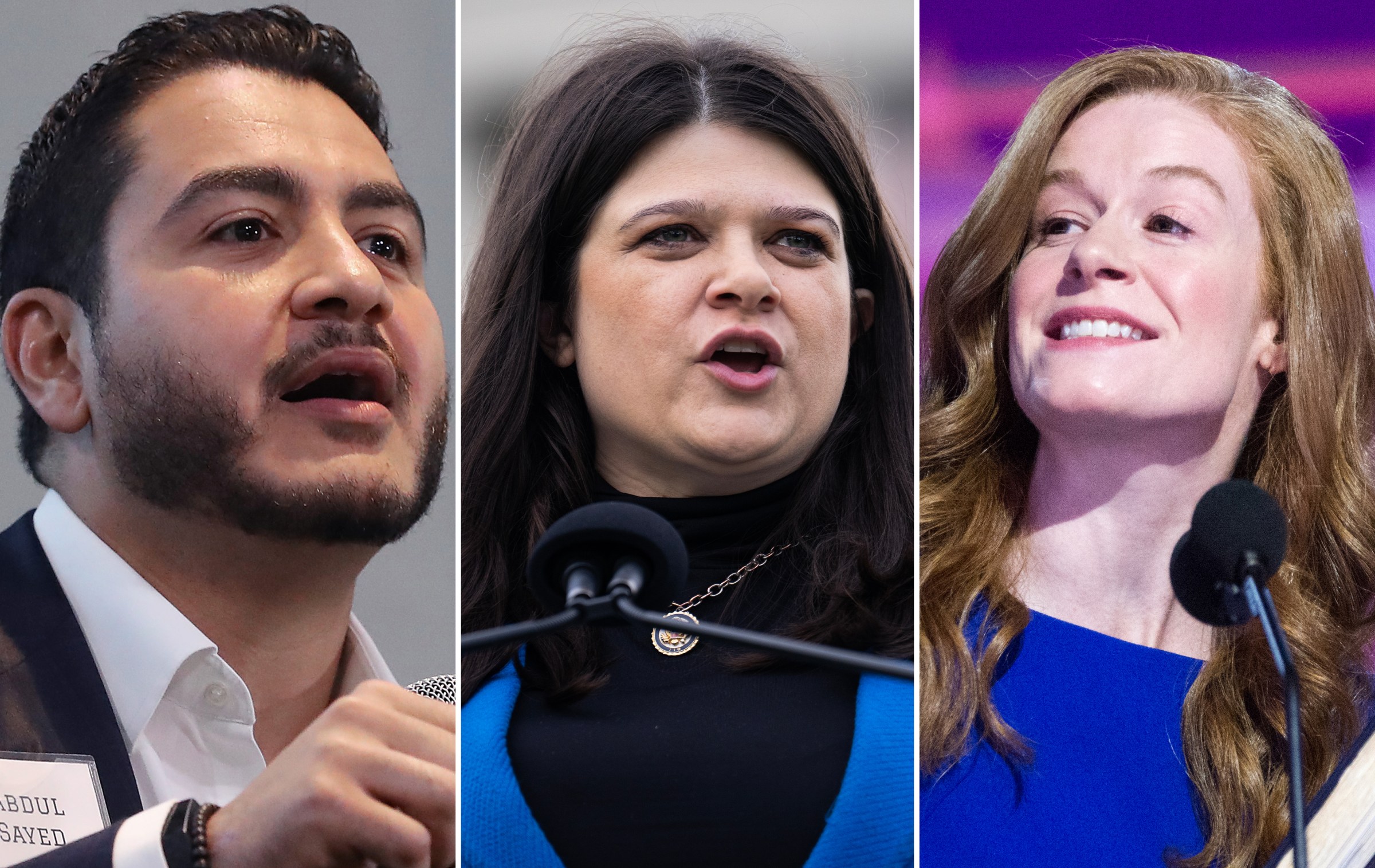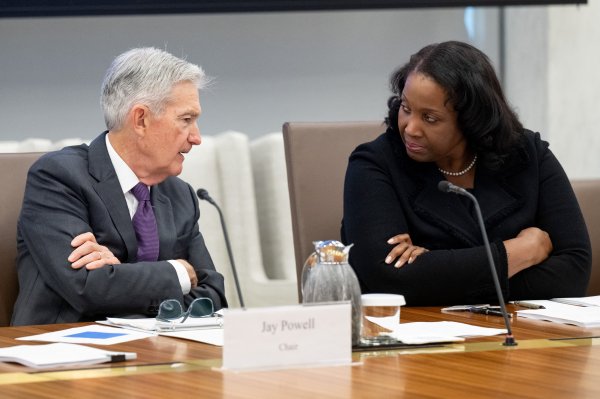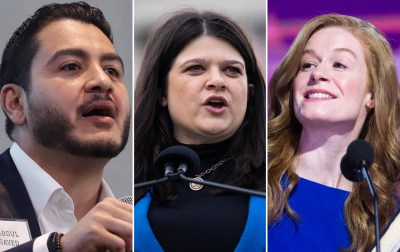IMLAY CITY, Michigan—Democrats rejoiced in late July after former North Carolina Gov. Roy Cooper announced that he would run to succeed Republican Sen. Thom Tillis, whose retirement after the 2026 election leaves his seat open for the cycle. Cooper was their best midterm Senate recruit yet, and he gave them confidence that they could win in a Trump-won state.
But other Democratic primaries are more contentious. Such is the case in the party’s primary for the Michigan Senate race. Republicans began salivating at a potential pickup opportunity after two-term Sen. Gary Peters announced earlier this year that he would not seek reelection in 2026. The GOP has its guy: Former Rep. Mike Rogers is the presumptive Republican nominee, taking another shot at the Senate after losing to Elissa Slotkin last year by just 0.3 points, or about 19,000 votes. With Rogers boasting that he has far more campaign infrastructure than he had at this point in 2024 and hoping to avenge his defeat, Democrats are eager to anoint a strong candidate to keep a seat the party has held since 1978.
With term-limited Gov. Gretchen Whitmer declining to run, three major candidates have emerged in the race for the nomination, making it the first competitive Democratic Senate primary in Michigan since 1994, which was the last time Republicans won a Senate seat here. The race is shaping up as a proxy battle among different factions in the party, with the Democratic establishment, base, and progressive wing all wanting different things. Who Democrats nominate in the pivotal swing state that Trump won last cycle will be a clue as to where the party is headed in the future.
Rep. Haley Stevens, a fourth-term congresswoman who represents some of the Detroit suburbs and is part of the center-left New Democratic Coalition in Congress, is the favorite of Democratic leadership. Former House Speaker Nancy Pelosi has endorsed her, and Senate Minority Leader Chuck Schumer has reportedly signaled that he believes Stevens is the most viable candidate. Early public polling of the race shows her faring the best against Rogers. Earlier this year, she received high marks from the Center for Effective Lawmaking, which ranked her the 12th most effective Democrat in the House for the 118th Congress—making her the highest-ranking House Democrat from Michigan—based on her ability to advance her agenda through the legislative process.
“Throughout my career, I’ve put my hand up to fight—and win—for Michiganders,” Stevens told The Dispatch in a written statement. “From helping save 200,000 jobs as Chief of Staff on President Obama’s auto rescue, to being named the most effective Democrat in the House from Michigan, I’ve always put Michigan first. And now, as Michigan is facing another moment of crisis with costs going up and up and up from the reckless Trump-Rogers tariff policy and constant abuses of power coming from this administration, I’m putting my hand up again to be Michigan’s champion in the U.S. Senate.”
Next is state Sen. Mallory McMorrow, who may have the most viral record of confronting the GOP. Now the Michigan Senate’s majority whip, she has been seen as a rising star in state Democratic politics since an impassioned 2022 speech on the upper legislative chamber’s floor vaulted her into prominence. She was responding to a fundraising email from Republican Sen. Lana Theis that mentioned her by name and claimed she wanted to “groom and sexualize kindergarteners.” That email came after McMorrow and other lawmakers had walked out on an invocation given by Theis, who claimed the state’s children were “under attack” by “forces that desire things for them other than what their parents would have them see and hear and know.”
Many Democrats saw McMorrow’s words as an effective response to Republican messaging around cultural issues, and her own fundraising efforts in the wake of the controversy netted her more than $1 million in three months. In a stump speech at an event in Imlay City, Michigan, last month, McMorrow recalled how her widely publicized floor speech drew attention—and money—to Democratic state legislative races. “I raised millions of dollars, not for myself, but for a dozen other candidates running for state Senate,” McMorrow said. “And in 2022 when all of the votes were counted, we flipped control of the state Senate, we flipped control of the state House, and we reelected Gov. Whitmer by over 10 points.”
Rounding out the field of major candidates is Abdul El-Sayed, a physician who has served as the director of the health departments of Detroit and Wayne County and made a bid for governor in 2018, where he lost by 20 points to Whitmer. He has received an endorsement from Sen. Bernie Sanders of Vermont and tied himself to Zohran Mamdani, the Democratic nominee for mayor of New York City. El-Sayed is touting his refusal to accept campaign donations from corporate PACs and running on a platform of combating big money in politics while seeking more aggressive antitrust enforcement and Medicare for All.
“I'm somebody who has been talking about the same set of issues now for, what, a decade since I got into public service? So my hope is that folks want a politics that works for working people,” El-Sayed told The Dispatch in an interview at an Ann Arbor coffee shop.
There has been little public polling of the primary thus far, but most surveys show Stevens in the lead, with McMorrow and El-Sayed trading the No. 2 spot. But the primary is hardly Stevens’ to win. In what’s likely to be an expensive race, McMorrow and El-Sayed each brought in more money following the three Democrats’ April announcements, according to their most recent disclosures, which cover funds received before the beginning of July.
What’s more, there appears to be little excitement among Democratic voters for Stevens. Alexander Diedrich, the 31-year-old chair of the Lapeer County Democratic Party, organized the Imlay City event where McMorrow and El-Sayed both spoke—and he told The Dispatch he was torn between them. “I don't quite see the same energy [from Stevens]. I don't quite see the same commitment,” he said.
Of the more than 15 voters who spoke to The Dispatch at two Democratic-aligned events in Michigan last month, only two said they were considering voting for the congresswoman.
“I like Haley Stevens. I think she's got a good head on her shoulders,” said 77-year-old Mike Kindreg, who attended an event with a local chapter of the progressive group Indivisible in East China. That was the most ringing endorsement of Stevens The Dispatch heard from a voter.
Such apathy toward Stevens is unsurprising. The Democratic base wants its party to oppose Trump with more energy, and it is unclear what Stevens, whom Republicans have tried to portray as an awkward speaker, has to offer in that regard.
Those seeking someone who can fight the messaging battle against the GOP might be attracted to McMorrow, who on the first NFL Sunday of 2025 released an ad in which she blasts “corporate greed” for higher prices. And multiple voters said they were drawn to her because of her 2022 speech.
“That speech alone, where she had to stick up for her own life of not being a groomer, and stuck up for marginalized people—and that pretty much cemented it,” Lori Sudomir, a 55-year-old audio engineer, said of why she was leaning toward McMorrow.
More left-wing Democratic voters, meanwhile, will understandably gravitate toward El-Sayed.
“I like the progressiveness of El-Sayed, and, I don't know, he’s kind of a Michigan Mamdani, and we need that,” said 69-year-old Mary Ellen Fox.
It is unclear what kind of message Stevens will craft to appeal to a Democratic base hungry for politicians who don’t appear tied to what it sees as a weak Democratic establishment. Rep. Hillary Scholten is to this point the only Democrat from the Michigan congressional delegation to have made an endorsement in the race and is backing Stevens.
“She is a legislator’s legislator. She has fantastic ideas for how to make Michigan better, stronger, more competitive,” Scholten told The Dispatch. “She's introduced 21 bills this Congress while she's running for the United States Senate. So for me, it was just a no-brainer. When we think about who we want to be leading the charge in terms of policymaking—because that's what this job is all about—Haley’s the best suited for that job.”
Democratic primary voters will decide next August which of the three will presumably take on Rogers, who has several advantages. For one, he doesn’t need to worry about the primary, already garnering Trump’s endorsement and not facing a credible Republican opponent. He won the 2024 GOP primary by almost 50 points, but he still faced bruising attacks from his fellow Republican candidates.
Rogers also got into the race sooner this time, announcing his candidacy in April, five months earlier than he did last cycle. His announcement for the 2024 campaign also came seven months after that of Slotkin, who outraised him by almost $40 million. Now, although he has trailed the Democratic candidates in fundraising thus far, Rogers is insisting that he is in a much better position than last year.
“Those are things we all can fix and have fixed already: clearing the primary, putting a team together much earlier,” he told The Dispatch in an interview. “Now we're working on our coalitions earlier. And we think that, in talking to the national folks, we'll have resources when we need them going into next year. And so, it's just a matter of putting all that together. And those are things that we can influence and we can do, and we've been doing all of that.”
With the Democratic primary seemingly wide open, Rogers is trying to equate all three candidates with the candidate furthest to the left, El-Sayed. In his interview, he did not even mention Stevens and McMorrow.
“I just lump them all together … I think the winning candidate today is Abdul El-Sayed, who wants to be the Mamdani of Michigan,” he said.
But there are meaningful differences among the three Democrats. Although domestic issues are likely to dominate the general election, they have especially divergent views on American aid to Israel, as they run in a state where over 100,000 Democratic presidential primary voters—largely part of the state’s significant Muslim and Arab-American population—chose “uncommitted” on the ballot in a rebuke to President Joe Biden’s support for the country in its war against Hamas in Gaza.
Stevens, who has been supported in the past by the American Israel Public Affairs Committee, has a record of backing aid. In late July, more than half of all Senate Democrats voted in favor of failed resolutions sponsored by Sanders to cut off sales of certain offensive weapons from Israel, as many pressed its government to do more to aid starving civilians in Gaza. Though she expressed her dismay at the situation in Gaza and called for aid to be given to the people living there, Stevens publicly conveyed her disagreement with the resolutions.
“I want this war to end and for Hamas to return the remaining hostages to their families and surrender, so that an enduring ceasefire for the Palestinian people and Israel can be achieved,” she said in a statement posted to X. “I do not believe the resolutions put forward this week in the U.S. Senate would have helped meet those goals.”
McMorrow has called for the United States to stop providing offensive weapons to the government of Prime Minister Benjamin Netanyahu. However, she did not extend that call to defensive munitions, such as supplies for the Iron Dome, which defends Israel from aerial attacks by Iran and its proxy groups such as Hamas and the Houthi rebels.
“Israel is in a unique situation where they're being bombed from all sides all the time,” McMorrow told The Dispatch. “And I come from a place of: I believe in peace and security for Israelis, and I believe in peace and security for Palestinians. So I support defensive weapons for Israel. But we need to find leverage to stop Netanyahu from continuing to pursue Gaza in the way that he is.”
Meanwhile, El-Sayed, who has described Israel’s actions as a genocide, said he supports stopping the transfer of both offensive and defensive weapons to Israel—noting that he would also approve of doing the same to countries such as Egypt and Pakistan (but not Ukraine). He said he does not believe people pay their taxes “to write blank checks to foreign militaries.”
“Israel is one of the richest countries in the world,” he told The Dispatch. “The idea that they can't afford their own military is kind of ridiculous. And I just think that in an era where I know that there are kids in our communities that are starving, our kids' schools are crumbling, where they keep telling us we can't afford health care for everybody, I'd much rather be spending our money here to do those things.”







Please note that we at The Dispatch hold ourselves, our work, and our commenters to a higher standard than other places on the internet. We welcome comments that foster genuine debate or discussion—including comments critical of us or our work—but responses that include ad hominem attacks on fellow Dispatch members or are intended to stoke fear and anger may be moderated.
With your membership, you only have the ability to comment on The Morning Dispatch articles. Consider upgrading to join the conversation everywhere.